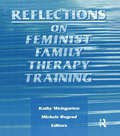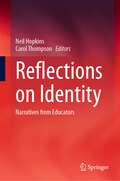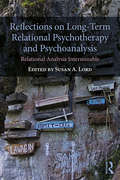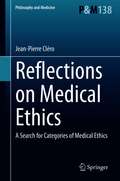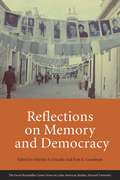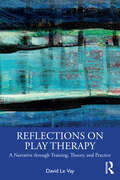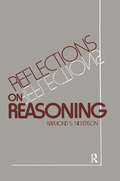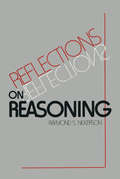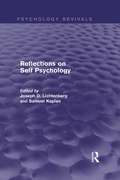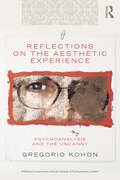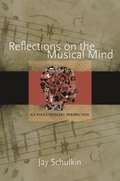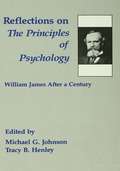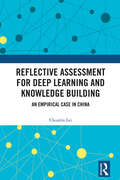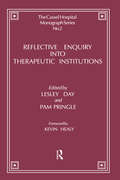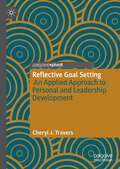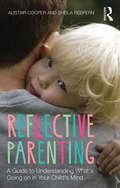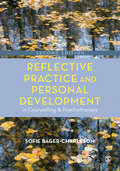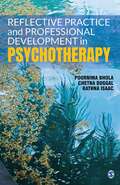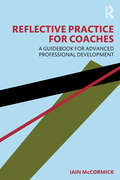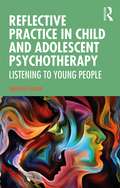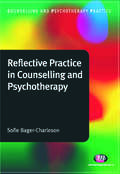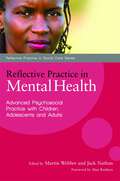- Table View
- List View
Reflections on Feminist Family Therapy Training (Journal Of Feminist Family Therapy Ser.)
by Michele Bograd Kaethe WeingartenAlthough feminist family therapy has been gaining recognition and followers in recent years, little is known about the variety of experiences, philosophies, and private learnings of feminist practitioners. Reflections on Feminist Family Therapy Training utilizes first-person accounts, theory, and commentary to explore the challenges feminist teachers and practitioners face and the aspects of their practice that are seldom considered.Readers of Reflections on Feminist Family Therapy Training acquire effective teaching strategies and a sensitivity to the intersection of cultural diversity and feminism. Students are introduced to several contextual factors that shape personal and professional experiences, as well as techniques that address predictable patterns of behavior and attitudes toward feminist family therapy in a variety of settings. The book presents innovative ideas and strategies from experienced trainers for tolerating, working with, and resolving gaps between theory and practice and for confronting hostility or tension within specific institutional contexts.Aimed at building bridges between teachers and practitioners of family therapy from a feminist perspective, Reflections on Feminist Family Therapy Training explores and helps you answer the following questions: What similarities and differences exist between American and European feminist family therapists? What special challenges does the feminist therapist face in a conventional training institute? Does a feminist or liberal context attend adequately to the needs of the multicultural student body? How does a trainer&’s national standing or tenure status promote or harm her freedom to practice openly in a specifically feminist way? What new directions and opportunities exist for feminist family therapists?Reflections on Feminist Family Therapy Training looks at the difficulties women practitioners face in convincing family therapy to recognize the significance of gender as a variable factor. In doing so, it offers specific classroom applications and general approaches to the feminist task of getting unheard and repressed voices acknowledged. Finally, the book outlines future directions for expanding and improving feminist-informed training and for giving it a more central and integrated position in the curricula.
Reflections on Identity: Narratives from Educators
by Carol Thompson Neil HopkinsThis book seeks to extend perspectives on professional identity in education. Chapters consider the notion of expertise, the impact of managerial approaches, the importance of communities of practice, and the effects of increasingly marketised approaches.By using narratives, the book opens up a ‘conversation’ about this important topic. Educators and leaders from a variety of settings will explore their professional experiences and the impact these have had on forming values in the professional role. By drawing on personal experience, individual authors will consider some of the challenges they have encountered as part of identity formation. The significance of organisational cultures is discussed throughout the book and explores the ways in which individual autonomy is both threatened and claimed. Issues discussed include the frequent changes imposed through government initiatives and the social perception of education professionals when compared to other professional roles. Contributions have been drawn from teachers and leaders in schools, colleges, universities and specialist training. Chapter authors have a variety of experiences offering a multi-perspective approach. This will include strategic leadership, operational management and classroom practice, all of which offer insights of interest to educators at various points on the professional journey. The narrative approach adopted by authors provides the opportunity for readers to engage with others’ experiences, enabling personal reflection on their own professional identity.
Reflections on Long-Term Relational Psychotherapy and Psychoanalysis: Relational Analysis Interminable
by Susan A. LordReflections on Long-Term Relational Psychotherapy and Psychoanalysis explores how relational analysts think about and pursue long-term therapeutic relationships in their practices. Many therapists work intensively with their clients over many years and don't necessarily talk about their work. More exploration is needed into what is taking place inside of these long-term relationships. The chapters cover a range of topics that focus on aspects of the therapeutic relationship that are unique to long-term psychoanalytic work. They include work with various issues such as trauma, death and dying, cross-cultural issues, suffering, mourning, neuropsychoanalysis, unique endings, attachment, intimacy, and the many ways in which therapists change along with their clients as they go through life stages together. Reflections on Long-Term Relational Psychotherapy and Psychoanalysis will be of great interest to psychoanalysts, psychodynamic psychotherapists, psychologists, social workers, workers in other mental health fields, graduate students, and anyone who is interested in change processes.
Reflections on Medical Ethics: A Search for Categories of Medical Ethics (Philosophy and Medicine #138)
by Jean-Pierre CléroThis book questions the notions of person, personality, dignity, and other connected notions such as (informed) consent, and discusses new perspectives on categories that allow ethical debates in medicine to overcome morals and ordinary religious schemes. The book states that one has to be careful when thinking about situations in terms of notions and principles that have been obtained in similar situations. Though this book is mostly philosophical, it is also of great practical interest to healthcare givers. It warns caregivers not to rely too much on notions such as person, autonomy, and consent, which are supposedly firm but can be proven to be unreliable in spite of appearances. Furthermore, this work warns against a narrow anthropologisation of ethics which would make technophobian positions unavoidable. On the contrary, this book is open to robotics and offers – among other things - a sustained exploration of the notion of intimacy.
Reflections on Memory and Democracy
by Merilee S. Grindle Erin E. GoodmanWhat is the role of history in the life of new democracies? In this volume, twelve reflections-the work of journalists, writers and poets, literary critics, political scientists, historians, philosophers, economists, and linguists-explore legacies of authoritarian political regimes noted for repression and injustice, questioning how collective experiences of violence shape memory and its relevance for contemporary social and political life in Latin America. The past matters deeply, the essayists agree, but the past itself is debatable and ambiguous. Avoiding its repetition introduces elusive and contested terrain; there are, indeed, many histories, many memories, and many ways they can be reflected in democratic contexts. In much of contemporary Latin America, this difficult past has not yet been fully confronted, and much remains to be done in reconciling memory and democracy throughout the region. As this is done, the lessons of the past must contribute not only to the construction of democratic institutions, but also to the engagement of democratic citizens in the collective work of governance and participation.
Reflections on Play Therapy: A Narrative through Training, Theory, and Practice
by David Le VayThis book explores an extensive range of questions and challenges within the training, theory, and practice of play therapy, with the aim of providing a stimulating and thought-provoking debate around many of the issues and dilemmas therapists experience.Drawing upon the author’s own experience as both a therapist and trainer/educator/supervisor, the volume grapples with questions of power, privilege, self-care, and mental health. It additionally addresses the wider challenges and impact of the Covid-19 pandemic, climate change, and international conflict upon practice and personhood. Questions around training are explored as well as specific practice challenges relating to managing limits and boundaries within play therapy and working with adopted children. Throughout the book, the author will reflect upon aspects of personal and clinical experience, sharing something of his own developmental narrative through training, teaching, and practice.Reflections on Play Therapy will serve as a core text for trainee play therapists and also a valuable resource for any experienced clinicians working therapeutically with children, young people, and families.
Reflections on Reasoning
by Raymond S. NickersonThis book is an adaptation of a report entitled Notes about Reasoning, prepared under a project on The Training of Higher Cognitive Learning and Thinking Skills that was sponsored by the National Institute of Education. My purpose in producing the notes was to help me clarify my own thinking about reasoning and how the ability to reason effectively might be enhanced in the classroom. I did not intend to write a textbook on reasoning or a scholarly review of research on reasoning processes, and this book is not presented as either now. It still has the character of a collection of thoughts; it is being published with the hope that some of the ideas and suggestions in it may stimulate some others, especially teachers and students, to reflect more than they otherwise might have upon what it means to reason effectively. One does not, of course, become an effective reasoner by reading a book on reasoning or by taking a course in reasoning. Learning to reason well is surely a lifelong process—or at least a lifelong challenge. If this book is useful in helping some readers to see the value of an enduring commitment to that challenge, it will have served its purpose. I wish to thank the NIE Project Officers, Patricia Butler and Joseph Psotka, for their support and encouragement. I am grateful also to John Swets, Richard Herrnstein, David Perkins and Carol Chomsky for helpful comments on an early draft of the manuscript, to Anne Kerwin and Patricia Carroll for typing the manuscript and to Brenda Starr and Frank DiPace for making electronic delivery of it to the printer possible by working around the differences between the sending and receiving systems. Special thanks to my wife, Doris, for her constant help of countless types, and most especially for bringing into the world the four beautiful people to whom this book is dedicated.
Reflections on Reasoning
by Raymond S. NickersonFirst published in 1986. Routledge is an imprint of Taylor & Francis, an informa company.
Reflections on Self Psychology (Psychology Revivals)
by Joseph D. Lichtenberg and Samuel KaplanOriginally published in 1983, Reflections on Self Psychology records the development of a powerful initiative to alter psychoanalytic theory and practice, and an evaluative questioning of this initiative. It presents a dialogue that developed at the Boston Symposium of 1980 between vigorous proponents of self psychology, equally energetic critics, and many participants between these polar positions. This book attempts to capture within its pages not only the content of what was presented, explored, and evaluated in Boston, but also a sense of the people, about 1,000 strong, who exchanged their ideas on and off the podium – and the remarkable spirit of open inquiry that invigorated these proceedings. The book, as was the meeting, is organized to explore four subjects: the development of the self: infant research; the implications of self psychology for psychoanalytic practice; self psychology and psychotherapy; and the implications of self psychology for psychoanalytic theory. The final section of the book is devoted to an essay by Heinz Kohut that provides an integrated response to the issues and criticisms raised in the course of the symposium. This essay while based on extemporaneous responses by Kohut during different phases of the meeting, is, in its written version, a cohesive, carefully revised, and edited statement prepared in the mellowing period following the meeting and before Kohut’s untimely death.
Reflections on the Aesthetic Experience: Psychoanalysis and the uncanny (The New Library of Psychoanalysis 'Beyond the Couch' Series)
by Gregorio KohonInterest in the relationship between psychoanalysis and art - and other disciplines - is growing. In his new book Reflections on the Aesthetic: Psychoanalysis and the uncanny, Gregorio Kohon examines and reflects upon psychoanalytic understandings of estrangement, the Freudian notions of the uncanny and Nachträglichkeit, exploring how these are evoked in works of literature and art, and are present in our response to such works. Kohon provides close readings of and insights into the works of Franz Kafka, Jorge Luis Borges, Louise Bourgeois, Juan Muñoz, Anish Kapoor, Richard Serra, Edvard Munch, Kurt Schwitters, amongst others; the book also includes a chapter on the Warsaw Ghetto Monument and the counter-monument aesthetic movement in post-war Germany. Kohon shows how some works of art and literature represent something that otherwise eludes representation, and how psychoanalysis and the aesthetic share the task of making a representation of the unrepresentable. Reflections on the Aesthetic is not an exercise in "applied" psychoanalysis; psychoanalysis and art are considered by the author in their own terms, allowing a new understanding of the aesthetic to emerge. Kohon’s book makes compelling reading for psychoanalysts, psychotherapists, art therapists, literary and art critics, academics, students and all those interested in the matter of the aesthetic.
Reflections on the Musical Mind: An Evolutionary Perspective
by Jay SchulkinWhat's so special about music? We experience it internally, yet at the same time it is highly social. Music engages our cognitive/affective and sensory systems. We use music to communicate with one another--and even with other species--the things that we cannot express through language. Music is both ancient and ever evolving. Without music, our world is missing something essential.In Reflections on the Musical Mind, Jay Schulkin offers a social and behavioral neuroscientific explanation of why music matters. His aim is not to provide a grand, unifying theory. Instead, the book guides the reader through the relevant scientific evidence that links neuroscience, music, and meaning. Schulkin considers how music evolved in humans and birds, how music is experienced in relation to aesthetics and mathematics, the role of memory in musical expression, the role of music in child and social development, and the embodied experience of music through dance. He concludes with reflections on music and well-being. Reflections on the Musical Mind is a unique and valuable tour through the current research on the neuroscience of music.
Reflections on the Principles of Psychology: William James After A Century
by Michael G. Johnson Tracy B. HenleyThis important volume looks back to 1890 and -- 100 years later -- asks some of the same questions William James was asking in his Principles of Psychology. In so doing, it reviews our progress toward their solutions. Among the contemporary concerns of 1990 that the editors consider are: the nature of the self and the will, conscious experience, associationism, the basic acts of cognition, and the nature of perception. Their findings: Although the developments in each of these areas during the last 100 years have been monumental, James' views as presented in the Principles still remain viable and provocative. To provide a context for understanding James, some chapters are devoted primarily to recent scholarship about James himself -- focusing on the time the Principles was written, relevant intellectual influences, and considerations of his understanding of this "new" science of psychology. The balance of this volume is devoted to specific topics of particular interest to James. One critical theme woven into almost every chapter is the tension between the role of experience (or phenomenological data) within a scientific psychology, and the viability of a materialistic (or biologically reductive) account of mental life. Written for professionals, practitioners, and students of psychology -- in all disciplines.
Reflections on the Revolution in France
by Riley QuinnEdmund Burke’s 1791 Reflections on the Revolution in France is a strong example of how the thinking skills of analysis and reasoning can support even the most rhetorical of arguments. Often cited as the foundational work of modern conservative political thought, Burke’s Reflections is a sustained argument against the French Revolution. Though Burke is in many ways not interested in rational close analysis of the arguments in favour of the revolution, he points out a crucial flaw in revolutionary thought, upon which he builds his argument. For Burke, that flaw was the sheer threat that revolution poses to life, property and society. Sceptical about the utopian urge to utterly reconstruct society in line with rational principles, Burke argued strongly for conservative progress: a continual slow refinement of government and political theory, which could move forward without completely overturning the old structures of state and society. Old state institutions, he reasoned, might not be perfect, but they work well enough to keep things ticking along. Any change made to improve them, therefore, should be slow, not revolutionary. While `Burke’s arguments are deliberately not reasoned in the ‘rational’ style of those who supported the revolution, they show persuasive reasoning at its very best.
Reflective Assessment for Deep Learning and Knowledge Building: An Empirical Case in China
by Chunlin LeiKnowledge building aims to transform schools into learning communities and bring knowledge creation into schools. The book therefore elaborates on how learning, technology, and assessment can be aligned both online and offline to facilitate such a process.Adopting a quasi-experimental design and drawing on rich data from forum discussions, questionnaires, interviews, learning outcomes, and classroom presentations, this book shows that the knowledge building environment, augmented by reflective assessment and principles, helped Chinese students to develop a deeper approach to learning, improved academic performance, and promoted collective knowledge advances. The book also discusses the potentials and challenges of designing technology-supported, assessment- and principle-based learning environments in tertiary contexts, especially when deep learning and knowledge building capacity are greatly emphasised in the knowledge era.The book will be of interest to scholars and educators working in learning sciences and computer-supported collaborative learning.
Reflective Enquiry into Therapeutic Institutions (The\cassel Hospital Monograph Ser.)
by David Bell R. D. Hinshelwood Wilhelm Skogstad Lesley Day Peter Griffiths Kevin Healy Pamela Pringle Agata Pisula Tom MainTherapeutic practice needs constant examination to ensure that it remains responsive and dynamic. Living organisms must communicate with their environment if they are to survive, and institutions are no different. This monograph, the second of the Cassell Hospital series, explores this concept further. By reading it, ideas and thinking will be sparked off that will help other organisations promote their own culture of enquiry.- Kevin Healy, Director of the Cassel Hospital, from his Foreword. The contemporary Cassel Hospital was developed by Tom Main to create a self-exploratory institution. Main argued that, in order for the hospital to be therapeutic, it needs a "culture of enquiry". The individual and the institution might be seduced into ritualised working practices that no longer serve the needs of patients or staff. It is these "lapses from the continual enquiry" that are considered by this collection. It describes the mostly unconscious manoeuvres that inhibit reflection, and how the inappropriate use of psychoanalytic ideas can close off enquiry within a therapeutic community.
Reflective Goal Setting: An Applied Approach to Personal and Leadership Development
by Cheryl J. TraversThis book presents, for the first time, a comprehensive overview of the Reflective Goal Setting model, its theoretical framework and origins, and its practical applications for personal development, improved coping and reduced stress, academic growth and performance and leadership.Divided into three parts, the author begins by examining the particular importance of personal development, and in particular soft and interpersonal skills development. It addresses the limitations of current personal development and leadership education and training for the transfer of learning, before outlining how Reflective Goal Setting fulfils this need. It presents a critical review of Goal Setting Theory and approaches to reflective practice that demonstrates how the Reflective Goal Setting model was developed from, and builds upon, these earlier approaches. Drawing on original research and illustrative case studies, the author details the cyclical five step process of the Reflective Goal Setting model across 5 chapters - forming Part 2 of the book. Part 3 examines the practical applications and impact of using Reflective Goal Setting, employing illustrative case studies from a variety of settings including higher education, professional development and executive education.This innovative work will provide a valuable resource for researchers and practitioners in Organisational and Industrial Psychology, Education, and Business and Management and indeed anyone who wants to work on their own personal development.
Reflective Parenting: A Guide to Understanding What's Going on in Your Child's Mind
by Alistair Cooper Sheila RedfernHave you ever wondered what's going on in your child's mind? This engaging book shows how reflective parenting can help you understand your children, manage their behaviour and build your relationship and connection with them. It is filled with practical advice showing how recent developments in mentalization, attachment and neuroscience have transformed our understanding of the parent-child relationship and can bring meaningful change to your own family relationships. Alistair Cooper and Sheila Redfern show you how to make a positive impact on your relationship with your child, starting from the development of the baby's first relationship with you as parents, to how you can be more reflective in relationships with toddlers, children and young people. Using everyday examples, the authors provide you with practical strategies to develop a more reflective style of parenting and how to use this approach in everyday interactions to help your child achieve their full potential in their development; cognitively, emotionally and behaviourally. Reflective Parenting is an informative and enriching read for parents, written to help parents form a better relationship with their children. It is also an essential resource for clinicians working with children, young people and families to support them in managing the dynamics of the child-parent relationship. This is a book that every parent needs to read.
Reflective Practice and Personal Development in Counselling and Psychotherapy (Counselling and Psychotherapy Practice Series)
by Sofie Bager-CharlesonReflective practice is a vital part of your counselling and psychotherapy training and practice. This book is your go-to introduction to what it is, why it is important, and how to use different models for reflection and reflective practice to enhance your work with clients. It will support your personal development and professional development throughout your counselling training and into your practice.
Reflective Practice and Personal Development in Counselling and Psychotherapy (Counselling and Psychotherapy Practice Series)
by Sofie Bager-CharlesonReflective practice is a vital part of your counselling and psychotherapy training and practice. This book is your go-to introduction to what it is, why it is important, and how to use different models for reflection and reflective practice to enhance your work with clients. It will support your personal development and professional development throughout your counselling training and into your practice.
Reflective Practice and Professional Development in Psychotherapy
by Poornima Bhola Chetna Duggal Rathna IsaacReflective Practice and Professional Development in Psychotherapy presents reflection as a tool to further self-exploration and aid professional development for psychotherapists and counsellors. It discusses the potential avenues, methods and spaces for self-reflective work. The book extensively cites both global and Indian research and presents therapist voices and perspectives, accompanied with self-reflective exercises and experiential activities. It highlights how the intersectional lens and diversity perspective can be integrated in reflective practice, especially for practitioners in India. The objective is to help the reader use reflection to critically examine, personalize and ‘own’ ideas that can nurture personal and professional growth. The book is indispensable for therapists at all levels of development and an important read for academicians, practitioners, trainers and supervisors from the disciplines of clinical and counselling psychology, social work and psychiatry.
Reflective Practice for Coaches: A Guidebook for Advanced Professional Development
by Iain McCormickThis practical evidence-based guide to running Reflective Practice professional development programmes provides a dynamic and engaging resource for a wide range of coaches. Reflective Practice is a proven learning and development approach that involves consciously and deliberately thinking about experiences to develop insights and apply these within coaching practice. McCormick argues that it is vital that coaches regularly reflect on their work to develop and grow professionally, and this book provides a definitive and rich source of material on how and what to reflect on. Topics include how to reflect as an individual coach; working in pairs and small groups; applying reflective practice in a training context; and how to run advanced group sessions for coaches. The book features a wide range of practical workbook exercises to challenge the reader’s current practice and extend their capability, as well as an evidence-based guide to enhancing skills in recently developed areas such as Unified Protocol Cognitive Behavioural Therapy, Internet Supplemented Acceptance and Commitment Therapy, and Using Schema Therapy with Mindfulness Techniques. Written by a highly experienced executive coach, this book is full of practical and effective ways to become more capable and proficient. It is essential reading for any career, life or executive coach who wishes to enhance their coaching capability through reflective practice, as well as for coaching training organisations, senior executive coaches offering sessions for other coaches, and academic institutions offering coaching qualifications.
Reflective Practice in Child and Adolescent Psychotherapy: Listening to Young People
by Jeanine ConnorTherapy referrals for a child or young person can be motivated for a number of reasons. The parents, carers or professionals responsible for their wellbeing might describe a sudden change in presentation, risk taking behaviour, such as self-harm or experimentation with drugs, alcohol or sex, or they might label the young person as over reacting, under reacting or attention seeking. Such behaviour prompts concern for their safety and confusion about why the child or young person is presenting the way they are. This book offers a thoughtful approach to making sense of such behaviour and encourages adults to ‘reflect on’ rather than ‘react to’ young peoples’ outward presentations. Based on the author’s work with children, young people and families over two decades, this book shares reflections from the therapy room and illustrates how the therapist can try to make sense of mood, behaviour and presentations that previously made no sense. The content relies heavily on clinical experience as well as drawing on classical and contemporary psychotherapeutic literature. So often adults find themselves reacting to observable behaviour in a judgmental or punitive way, rather than pausing to consider what the behaviour might be communicating. The author aims to model a thoughtful reflective approach to making sense of what might be going on for children and young people and this book will be of great interest to child and adolescent psychotherapists, related professionals and those with an interest in young persons’ mental health.
Reflective Practice in Counselling and Psychotherapy (Counselling and Psychotherapy Practice Series)
by Sofie Bager-CharlesonA good understanding of reflective practice is essential for good practice in counselling and psychotherapy, and is a criterion for accreditation with the British Association for Counselling and Psychotherapy. This book takes students on a step-by-step journey through the history of reflective practice, from its origins with Donald Schon through to ideas of knowledge and power and how the counsellor or psychotherapist deals with issues surrounding the 'self'. A central theme of the book is the concept of self-reflection and what motivates a therapist to do an often difficult and sometimes emotionally complex job.
Reflective Practice in Nursing
by Mrs Lioba Howatson-JonesReflection enables us to make sense of, and learn from, experiences that can seem uncertain, chaotic or even mundane. It is a core skill that student nurses must grasp to develop professionally, and is a requirement of the professional standards. This book introduces student nurses to reflection in a clear and practical manner. It shows different ways of using reflection to learn and develop as a practitioner, including exploring personal experiences. It gives practical tips on using reflection throughout the pre-registration programme and empowers the student nurse to take ownership of their own learning by developing this important skill.
